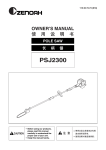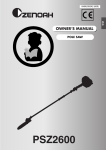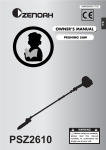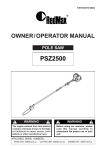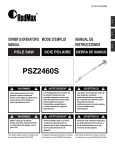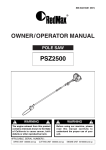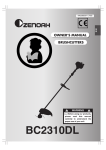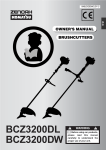Download Zenoah PSJ2300 Owner`s manual
Transcript
115 40 42-38 (011) G B OWNER’S MANUAL POLE SAW PSJ2300 PSJ2300 SAFETY FIRST Instructions contained in warnings within this manual marked with a symbol concern critical points which must be taken into consideration to prevent possible serious bodily injury, and for this reason you are requested to read all such instructions carefully and follow them without fail. WARNINGS IN THE MANUAL WARNING This mark indicates instructions, which must be followed in order to prevent accidents, which could lead to serious bodily injury or death. IMPORTANT Contents 1. Parts location....................................................2 2. Specifications....................................................3 3. Warning labels on the machine........................3 4. Symbols on the machine...................................3 5. For safe operation.............................................4 6. Set up................................................................7 7. Fuel and chain oil..............................................9 8. Operation........................................................10 9. Maintenance...................................................12 10. Storage............................................................15 11. Disposal..........................................................15 12. Troubleshooting guide....................................16 This mark indicates instructions, which must be followed, or it leads to mechanical failure, breakdown, or damage. NOTE This mark indicates hints or directions useful in the use of the product. This pole-mounted powered pruner (hereafter called pruner) is designed especially for tree service by a trained operator. For safe operation, you must read and understand this owner's manual completely before operating the pruner. Note: Illustrations and specifications in this manual may vary according to requirements of individual countries and are subject to change without notice by the manufacturer. 1. Parts location 1. 2. 3. 4. 5. 6. 7. 8. 9. 10. 11. 12. 13. 14. 15. 16. 17. 18. 19. 20. 21. 22. 23. 24. GB-2 Loop handle Suspension point Stop switch Throttle cable Throttle trigger Shaft tube Knob bolt Starter knob Fuel tank Primer Choke lever Air cleaner cover Guide bar Saw chain Chain cover Transmission Guide bar cover Hexagon socket (S16/S19) with torx driver Wrench Spanner Screw driver Harness Goggles Owners’ manual PSJ2300 2. Specification PSJ2300 Overall size (L x W x H).......10”: 2840 x 244 x 232mm .......12”: 2887 x 244 x 232mm Dry weight .................................................. 10”: 5.9kg ...................................................12”: 6.0kg Engine Type...............Air-cooled 2-stroke gasoline Model................................. Zenoah G23LS Displacement............................... 22.5cm3 Fuel................................................................... Mixture when using ZENOAH genuine oil (FC grade) .... 50:1 when using market oil (FB grade) . ................... 25:1 Carburetor............................. Walbro Diaphragm type Spark plug............................................. NGK BPMR7A Fuel tank capacity.................................................. 0.6 Transmission......... Centrifugal clutch, Rigid driveshaft Reduction ratio..................................................... 1.06 Cutting head Guide bar Type.................. OREGON 90MICRO-LITE Size ...................................10 (25) in.(cm) ...................................12 (30) in.(cm) Saw chain Type................ 10”: OREGON 90SG-J39E ................ 12”: OREGON 90SG-J44E Pich x Gauge..... 3/8x0.043 (9.53x1.07) in.(mm) Sprocket................................................................... 7T Oil pump...................................................Plunger type Standard Accessories Shoulder Strap..................................................... 1 pc. Goggle..................................................................1 pc. Tool Kit................................................................. 1 pc. Guide bar protector............................................. 1 pc. Goggles............................................................... 1 pc. Specifications are subject to change without notice. 3. Warning labels on the machine If warning label peels off or becomes soiled and impossible to read, you should contact the dealer from which you purchased the product to order new labels and affix them in the required location(s). (1) Read owner's manual before operating this machine. (2) Wear head, eye and ear protection. (3) Warning/Attention (4) The unit has not been designed to provide protection from electric shock in the event of contact with overhead electric lines. Never modify your machine. We won’t warrant the machine, if you use the remodeled pruner or if you don’t observe the proper usage written in the manual. 4. Symbols on the machine For safe operation and maintenance, symbols are carved in relief on the machine. According to these indications, please be careful not to make a mistake. The port to refuel the “MIX GASOLINE” Position: FUEL TANK CAP The direction to close the choke Position: AIR CLEANER COVER The direction to open the choke Position: AIR CLEANER COVER MIN MAX If you turn the rod by screwdriver follow the arrow to the “MAX” position, the chain oil flow more, and if you turn to the “MIN” position, less. Position: Bottom of the TRANSMISSION GB-3 G B PSJ2300 5. For safe operation 1. Read this manual carefully until you completely understand and follow all safety and operating instructions. 2. Keep this manual handy so that you may refer to it later whenever any questions arise. Also note, if you have any questions which cannot be answered herein, contact the dealer from whom you purchased the product. 3. Always be sure to include this manual when selling, lending, or otherwise transferring the ownership of this product. 4. Never allow children or anyone unable to fully understand the directions given in the manual to use the machine. WORKING CONDITION 1. When using the product, you should wear proper clothing and protective equipment. (1) Helmet (2) Ear protectors (3) Protection goggles or face protector (4) Thick work gloves (5) Non-slip-sole work boots 2. And you should carry with you. (1) Attached tools (2) Properly reserved fuel (3) Spare blade (4) Things to notify your working area (rope, warning signs) (5) Whistle (for collaboration or emergency) (6) Hatchet or saw (for removal of obstacles) 3. Do not wear loose clothing, jewelry, short trousers, sandals, or go barefoot. Do not wear anything which might be caught by a moving part of the unit. Secure hair so it is above shoulder length. GB-4 WORKING CIRCUMSTANCE 1. Never start the engine inside a closed room or building. Exhaust gases contain dangerous carbon monoxide. 2. Never use the product, a. when the ground is slippery or when you can’t maintain a steady posture. b. At night, at times of heavy fog, or at any other times when your field of vision might be limited and it would be difficult to gain a clear view of the working area. c. During rain storms, during lightning storms, at times of strong or gale-force winds, or at any other times when weather conditions might make it unsafe to use the product. WORKING PLAN 1. You should never use the product when under the influence of alcohol, when suffering from exhaustion or lack of sleep, when suffering from drowsiness as a result of having taken cold medicine or at any other time when a possibility exists that your judgment might be impaired or that you might not be able to operate the product properly and in a safe manner. 2. When planning your work schedule, allow plenty of time to rest. Limit the amount of time over which the product is to be used continuously to somewhere around 30 - 40 minutes per session, and take 10 - 20 minutes of rest between work sessions. Also try to keep the total amount of work performed in a single day under 2 hours or less. WARNING 1. If you don’t observe the working time, or working manner (See “USING THE PRODUCT”), Repetitive Stress Injury (RSI) could occur. If you feel discomfort, redness and swelling of your fingers or any other part of your body, see a doctor before getting worse. 2. To avoid noise complaints, in general, operate product between 8 a.m. and 5 p.m. on weekdays and 9 a.m. to 5 p.m. on weekends. NOTE Check and follow the local regulations as to sound level and hours of operations for the product. BEFORE STARTING THE ENGINE 1. Operate the chain saw only in well ventilated areas. Never start or run the engine inside a closed room or building. Exhaust fumes contain dangerous carbon monoxide. 2. The area within a perimeter of 15 m of the person using the product should be considered a hazardous area into which no one should enter. If necessary, yellow warning rope, warning signs should be placed around the perimeter of the area. When work is to be performed simultaneously by two or more persons, care should also be taken to constantly look around or otherwise check for the presence and locations of other people working so as to maintain a distance between each person sufficient to ensure safety. 3. Check the condition of working area to avoid any accident by hitting hidden obstacles such as stumps, stones, cans, or broken glass. PSJ2300 5. For safe operation IMPORTANT Remove any obstacle before beginning work. 4. Inspect the entire unit for loose fasteners and fuel leakage. Make sure that the cutting attachment is properly installed and securely fastened. 5. Always use the harness. Adjust the harness for comfort before starting the engine. The harness should be adjusted so the left hand can comfortably hold the handlebar grip approximately waist high. STARTING THE ENGINE 1. Keep bystanders and animals at least 15 m away from the operating point. If you are approached, immediately stop the engine. 2. The product is equipped with a centrifugal clutch mechanism, so the cutting attachment begins to rotate as soon as the engine is started by putting the throttle trigger into the start position. When starting the engine, place the product onto the ground in a flat clear area and hold it firmly in place so as to ensure that neither the cutting part nor the throttle come into contact with any obstacle when the engine starts. WARNING Never place the throttle trigger into the high-speed position when starting the engine. 3. After starting the engine, check to make sure that the cutting attachment stops rotating when the throttle is moved fully back to its original position. If it continues to rotate even after the throttle trigger has been moved fully back, turn off the engine and take the unit to your authorized ZENOAH servicing dealer for repair. USING THE PRODUCT IMPORTANT Cut only materials recommended by the manufacturer. And use only for tasks explained in the manual. 1. Grip the handles firmly with both hands using your whole hand. Place your feet slightly apart (slightly further apart than the width of your shoulders) so that your weight is distributed evenly across both legs, and always be sure to maintain a steady, even posture while working. 2. Maintain the speed of the engine at the level required to perform cutting work, and never raise the speed of the engine above the level necessary. 3. Never operate the pruner at an angle greater than 60° in order to reduce the risk of being struck by falling objects during operation. 4. If the unit starts to shake or vibrate, turn off the engine and check the whole unit. Do not use it until the trouble has been properly corrected. 5. Keep all parts of your body away from rotating cutting attachment and hot surfaces. 6. Never touch the muffler, spark plug, or other metallic parts of the engine while the engine is in operation or immediately after shutting down the engine. Doing so could result in serious burns or electrical shock. WARNING Approaching or contacting electric power lines with the pruner may cause serious injury death from electrocution. Electricity can jump from one point to another by means arcing or may be conducted through damp branches. Maintain a clearance of at least 15m between the pruner and any electrical line carrying live current. • IF SOMEONE COMES 1. Guard against hazardous situations at all times. Warn adults to keep pets and children away from the area. Be careful if you are approached. Injury may result from flying debris. 2. If someone calls out or otherwise interrupts you while working, always be sure to turn off the engine before turning around. MAINTENANCE 1. In order to maintain your product in proper working order, perform the maintenance and checking operations described in the manual at regular intervals. 2. Always be sure to turn off the engine and disconnect the spark plug wire before performing any maintenance or checking procedures. WARNING The metallic parts reach high temperatures immediately after stopping the engine. 3. When replacing the cutting attachment or any other part, or when replacing the oil or any lubricant, always be sure to use only ZENOAH products or products which have been certified by ZENOAH for use with the ZENOAH product. 4. In the event that any part must be replaced or any maintenance or repair work not described in this manual must be performed, please contact a representative from the store nearest ZENOAH authorized servicing dealer for assistance. 5. Do not use any accessory or attachment other than those bearing the ZENOAH mark and recommended for the unit. 6. Under no circumstances should you ever take apart the product or alter it in any way. Doing so might result in the product becoming damaged during operation or the product becoming unable to operate properly. GB-5 G B PSJ2300 5. For safe operation HANDLING FUEL 1. The engine of the ZENOAH product is designed to run on a mixed fuel, which contains highly flammable gasoline. Never store cans of fuel or refill the tank of the unit in any place where there is a boiler, stove, wood fire, electrical sparks, welding sparks, or any other source of heat or fire which might ignite the fuel. 2. Never smoke while operating the unit or refilling its fuel tank. 3. When refilling the tank, always turn off the engine and allow it to cool down. Take a careful look around to make sure that there are no sparks or open flames anywhere nearby before refueling. 4. Wipe spilled fuel completely using a dry rag if any fuel spillage occurs during refueling. 5. After refueling, screw the fuel cap back tightly onto the fuel tank and then carry the unit to a spot 3 m or more away from where it was refueled before turning on the engine. TRANSPORTATION 1. When you finish cutting in one location and wish to continue work in another spot, turn off the engine, lift up the unit and carry it paying attention to the blade. 2. Never forget to place the protective cover over the blades. 3. When hand-carrying the product, cover over the cutting attachment if necessary, lift up the product and carry it paying attention to the cutting attachment. 4. Never transport the product over rough roads over long distances by vehicle without removing all fuel from the fuel tank. If doing so, fuel might leak from the tank during transport. Kickback and Pinching Safety Precautions Beware of kickback! Kickback can occur whenever the tip of the guide bar touches an object while the saw is operating. Kickback may force the bar up and back toward the operator with lightning-like speed! Beware of pinching. Pinching the saw along the tip of the guide bar may force the bar back rapidly toward the operator. Pinching can occur whenever wood closes in around the moving chain. WARNING GB-6 Both kickback and pinching may cause you to lose control of the pole pruner which could result in serious personal injury. Do not rely exclusively on the safety device built into the pruner! You must take several steps to keep your jobs free from accident or injury: 1. Understand kickback and pinching! You can reduce or eliminate the element of surprise. Sudden surprises contributes to accidents. 2. Keep a firm grip on the pole pruner with both hands whenever the engine is running. A firm grip will help you reduce the affects of kickback and pinching as well as maintain control of the machine. 3. Make sure the area in which you are cutting is free from obstructions. Do not let the nose of the guide bar contact a log, branch, or any other obstructions which could be hit while you operation the pole pruner. 4. Cut at high engine speeds. 5. Follow the manufacturer’s instructions for sharpening and maintaining the chain. 6. Use only the replacement bar and chain or equivalent as specified by the manufacturer. WARNING • Make sure the chain and sprocket are correctly adjusted before operating the pruner (see page 14~15 for adjustment procedures). Never attempt chain adjustment with the engine running! • Always make sure the cutting attachment is properly installed and firmly tightened before operation. • Never use a cracked or warped guide bar: replace it with a serviceable one and make sure it fits properly. • If saw chain should bind fast in a cut, shut off the engine immediately. Push the branch or tree to ease the bind and free saw chain. • Do not operate the pruner with the muffler removed. • When cutting a limb that is under tension, be alert for springback so that you will not be struck by the moving limb. • Always stop the engine immediately and check for damage if you strike a foreign object or if the machine becomes tangled. Do not operate with broken or damaged equipment. IMPORTANT • Do not make unauthorized modifications or substitutions to the guide bar or chain. • Never allow the engine to run at high RPM without a load. Doing so could damage the engine. • Keep the pruner as clean as possible. Keep it free of loose vegetation, mud, etc PSJ2300 6. Set up • Install the handle to the shaft tube and clamp it at a location that is comfortable to you. MOUNTING ENGINE JOINT ATTACHMENT G B (1) (1) Knob bolt 1. Push the shaft tube toward the clutch housing and rotate it by hand to check that the power transmission shaft is engaged with the gears. 2. Insert the power transmission shaft housing into the clutch housing until it bottoms, and align the positioning holes on the clutch housing and the shaft tube and install the screw. When difficult to engage, twist the engine slightly. 3. Fasten the clamp securely with two screws. IMPORTANT Tighten the screws gradually by turns. CONNECTING THROTTLE WIRE 1. Remove the air cleaner cover. 2. Connect the end of the throttle wire to the joint on the top of the carburetor. CONNECTING SWITCH WIRES (1) 3mm or more • Insert the attachment to the main shaft. • Tighten the knob bolt securely. ATTACHING THE PRUNING MECHANISM (1) (2) (3) (4) (5) (1) Shaft tube (3) Screw hole (5) Bolt (2) Transmission (4) Fastening bolt 1. Remove the cap on the end of the shaft tube. 2. Remove the screw screwed into the end of the transmission. 3. Insert the end of the transmission into the shaft tube. 4. Line up the hole on the end of the transmission into which the screw is to be inserted with the hole on the shaft tube, and screw the screw firmly in. 5. Using a wrench, screw in the bolt provided to fix the mechanism into place. A standard package contains the items as shown below. • Connect the switch wires between the engine and the main unit. • Fix the switch wire like figure of SE3. • The space between a tank and switch wires is 3mm or more. INSTALLING HANDLE (1) About 48cm (1) Guide bar (3) Transmission (5) Chain tension adjust screw (7) Chain tensioner nut (2) Saw chain (4) Sprocket (6) Nut (8) Chain cover Install the guide bar and the saw chain on the transmission as follows. GB-7 PSJ2300 6. Set up WARNING The saw chain has very sharp edges. Use protective gloves for safety. 5. Tighten the mounting nut securely with the bar tip held up (TORQUE: 8.9~11.7 N.m./90~120 kg-cm). Then check the chain for smooth rotation and correct tension while moving it by hand. If necessary, readjustment. 1. Loosen a nut and remove the chain cover. 2. Mount the guide bar then fit the saw chain around the bar and sprocket. WARNING Pay attention to the correct direction of the saw chain 3. Fit the chain tensioner nut into the lower hole of the guide bar, then install the chain cover, and fasten the mounting nut to finger tightness. (1) Hole (2) Moving direction (3) Chain tensioner nut (1) Tighten WARNING It is very important to maintain the proper chain tension. Rapid wear of the guide bar or the chain coming off easily can be caused by improper tension. Especially when using a new chain, take good care of it since it should expand when first used. BALANCE UNIT 1. Put on strap and attach unit to strap. 2. Depending on the working posture, slide clamp up or down until unit balances and the strap fits your body. 4. Adjust the chain tension by turning the tensioner screw until the tie straps just touch the bottom side of the bar rail. (1) Chain tension adjusting screw (a) Loosen (b) Tighten GB-8 PSJ2300 7. Fuel and chain oil ■Fuel WARNING • Gasoline is very flammable. Avoid smoking or bringing any flame or sparks near fuel. Make sure to stop the engine and allow it cool before refueling the unit. Select outdoor bare ground for fueling and move at least 3 m (10 ft) away from the fueling point before starting the engine. • The Zenoah engines are lubricated by oil specially formulated for air-cooled 2-cycle gasoline engine use. If Zenoah oil is not available, use an anti-oxidant added quality oil expressly labeled for air-cooled 2-cycle engine use (JASO FC GRADE OIL or ISO EGC GRADE). • Do not use BIA or TCW (2-stroke water-cooling type) mixed oil. ■RECOMMENDED MIXING RATIO GASOLINE 50 : OIL 1 (when using ZENOAH genuine oil) • Exhaust emission are controlled by the funda mental engine parameters and components (eq., carburation, ignition timing and port timing) without addition of any major hardware or the introduction of an inert material during combustion. • These engines are certified to operate on unleaded gasoline. • Make sure to use gasoline with a minimum octane number of 89RON (USA/Canada: 87AL). • If you use a gasoline of a lower octane value than prescribed, there is a danger that the engine temperature may rise and an engine problem such as piston seizing may consequently occur. • Unleaded gasoline is recommended to reduce the contamination of the air for the sake of your health and the environment. • Poor quality gasolines or oils may damage sealing rings, fuel lines or fuel tank of the engine. ■ HOW TO MIX FUEL WARNING • Pay attention to agitation. 1. Measure out the quantities of gasoline and oil to be mixed. 2. Put some of the gasoline into a clean, approved fuel container. 3. Pour in all of the oil and agitate well. 4. Pour in the rest of gasoline and agitate again for at least one minute. As some oils may be difficult to agitate depending on oil ingredients, sufficient agita- tion is necessary for the engine to last long. Be careful that, if the agitation is insufficient, there is an increased danger of early piston seizing due to abnormally lean mixture. 5. Put a clear indication on the outside of the container to avoid mixing up with gasoline or other containers. 6. Indicate the contents on outside of container for easy identification. ■FUELING THE UNIT 1. Untwist and remove the fuel cap. Rest the cap on a dustless place. 2. Put fuel into the fuel tank to 80% of the full capacity. 3. Fasten the fuel cap securely and wipe up any fuel spillage around the unit. WARNING 1. Select flat and bare ground for fueling. 2. Move at least 10 feet (3 meters) away from the fueling point before starting the engine. 3. Stop the engine before refueling the unit. At that time, be sure to sufficiently agitate the mixed gasoline in the container. ■FOR YOUR ENGINE LIFE, AVOID: 1. FUEL WITH NO OIL (RAW GASOLINE) – It will cause severe damage to the internal engine parts very quickly. 2. GASOHOL – It can cause deterioration of rubber and/ or plastic parts and disruption of engine lubrication. 3. OIL FOR 4-CYCLE ENGINE USE – It can cause spark plug fouling, exhaust port blocking, or piston ring sticking. 4. Mixed fuels which have been left unused for a period of one month or more may clog the carburetor and result in the engine failing to operate properly. 5. In the case of storing the product for a long period of time, clean the fuel tank after rendering it empty. Next, activate the engine and empty the carburetor of the composite fuel. 6. In the case of scrapping the used mixed oil container, scrap it only at an authorized repository site. NOTE As for details of quality assurance, read the description in the section Limited Warranty carefully. Moreover, normal wear and change in product with no functional influence are not covered by the warranty. Also, be careful that, if the usage in the instruction manual is not observed as to the mixed gasoline, etc. described therein, it may not be covered by the warranty. ■Chain oil Use motor oil SAE #10W-30 all year round or SAE #30 - #40 in summer and SAE #20 in winter. NOTE Do not use wasted or regenerated oil that can cause damage to the oil pump. GB-9 G B PSJ2300 8. Operation 6. While holding the unit firmly, pull out the starter rope quickly until engine fires. STARTING ENGINE WARNING The cutting head will start rotating upon the engine starts. 1. Feed fuel and chain oil into their respective tanks and tighten the caps securely. IMPORTANT (1) Fuel (2) Chain oil 2. Rest the unit on a flat, firm place. Keep the cutting head off the ground and clear of surrounding objects as it will start rotating upon starting of the engine. 3. Push the primer several times until overflown fuel flows out in the clear tube. 4. Move the choke lever to the closed position. (1) Choke lever (2) Close (3) Open (4) Primer • Avoid pulling the rope to its end or returning it by releasing the knob. Such actions can cause starter failures. 7. Move the choke lever downward to open the choke. And restart the engine. 8. Allow the engine to warm up for a several minutes before starting operation. NOTE 1. When restarting the engine immediately after stopping it, leave the choke open. 2. Overchoking can make the engine hard to start due to excess fuel. When the engine failed to start after several attempts, open the choke and repeat pulling the rope, or remove the spark plug and dry it. STOPPING ENGINE 1. Release the throttle trigger and run the engine for a half minute. 2. Shift the stop switch to the “Stop” position. 5. Set the stop switch to the “RUN” position. Place the unit on a flat place. Keep the cutting head clear of everything around it. (1) (1) Stop switch IMPORTANT • Except for an emergency, avoid stopping the engine while pulling the throttle trigger. Checking oil supply • After starting the engine, run the chain at medium speed and see if chain oil is scattered off as shown in the figure. (1) Chain oil GB-10 PSJ2300 8. Operation NOTE The oil reservoir has a capacity sufficient to provide about 40 minutes of cutting time (when set to deliver the minimum flow rate, or about as long as you’ll get from a tank of fuel). Be sure to refill the oil tank every time when refueling the saw. (a)Clockwise-decrease lubrication. (b)Counter clockwise-increase lubrication. (c)Middle ADJUSTING THROTTLE CABLE • The normal play is 1 or 2mm when measured at the carburetor side end. Readjust with the cable adjuster as required. ADJUSTING OIL FLOW RATE WARNING Never fill the oil reservoir nor adjust the oiler with the engine running. (1) Cable adjuster 1~2mm (1) IMPORTANT An increase in bar oil flow rate will speed oil consumption, requiring more frequent checks on the oil reservoir. To ensure sufficient lubrication, It may be necessary to check the oil level more frequently than at fuel tank refills. The guide bar and chain are lubricated automatically by a pump that operates whenever the chain rotates. The pump is set at the factory to deliver a minimum flow rate, but it can be adjusted in the field. A temporary increase in oil flow is often desirable when cutting things like hardwood or wood with a lot of pitch. Adjust the pump as follows: 1. Stop the engine and make sure the stop switch is in the STOP position. 2. Place the unit on its side with the oil reservoir up. ADJUSTING IDLING SPEED (1) Idle adjusting screw 1. When the engine tends stop frequently at idling mode, turn the adjusting screw clockwise. 2. When the cutting head keeps rotating after releasing the trigger, turn the adjusting screw counter-clockwise. NOTE • Warm up the engine before adjusting the idling speed. (1) Oil tank (2) Chain cover IMPORTANT WARNING • Always wear work gloves made of leather or some other sturdy material when using the polesaw. • Falling branches may fall onto the face or into the eyes, resulting in injuries, scratches, and cuts, and for this reason you should always be sure to wear a helmet and face protector when using your polesaw. The oil flow adjusting screw must be pressed in slightly in order to turn. Failure to do so could damage the pump and screw. 3. With a screwdriver, push in on the oil flow rate adjusting screw and turn in the desired direction (there are three incremental settings): GB-11 G B PSJ2300 9. Maintenance System/components CUTTING UNIT SHAFT ENGINE fuel leaks, fuel spillage fuel tank, air filter, fuel filter idle adjusting screw spark plug cylinder fins, intake air cooling vent muffler, spark arrester, cylinder exhaust port throttle trigger, stop switch transmission screws/nuts/bolts oiling port guide bar sprocket saw chain Every Every Every 100 50 Before 25 Note Procedure use hours hours hours after after after wipe out ✔ inspect/clean replace, if necessary ✔ ✔ replace carburetor see ADJUSTING IDLING ✔ if necessary SPEED (p.11) GAP: 0.6 - 0.7 mm clean and readjust ✔ replace, if necessary electrode gap clean ✔ clean, remove piled up carbon check operation grease tighten/replace clean clean inspect/replace inspect/replace AIR FILTER • The air filter, if clogged, will reduce the engine performance. Check and clean the filter element in warm, soapy water as required. Dry completely before installing. If the element is broken or shrunk, replace with a new one. ✔ ✔ ✔ ✔ ✔ ✔ ✔ not adjusting screws ✔ ✔ SPARK PLUG • Starting failure and mis-firing are often caused by a fouled spark plug. Clean the spark plug and check that the plug gap is in the correct range. For a replacement plug, use the correct type specified by ZENOAH. 0.6 – 0.7mm (1) Air filter • REPLACEMENT PLUG IS A NGK BPMR7A. IMPORTANT FUEL FILTER • When the engine runs short of fuel supply, check the fuel cap and the fuel filter for blockage. (1) Fuel filter GB-12 • Note that using any spark plug other than those designated may result in the engine failing to operate properly or in the engine becoming overheated and damaged. • To install the spark plug, first turn the plug until it is finger tight, then tighten it a quarter turn more with a socket wrench. 14.7 - 21.6 N.m TIGHTENING TORQUE: (150 - 220 kg-cm) PSJ2300 9. Maintenance TRANSMISSION The reduction gears are lubricated by multipurpose, lithium-based grease in the transmission. Supply new grease every 25 hours of use or more often depending on the job condition. When adding lubricant, use a grease gun to insert lubricant into the three grease nipples located on the transmission. PROCEDURES TO BE PERFORMED AFTER EVERY 100 HOURS OF USE 1. Remove the muffler, insert a screwdriver into the vent, and wipe away any carbon buildup. Wipe away any carbon buildup on the muffler exhaust vent and cylinder exhaust port at the same time. 2. Tighten all screws, bolts, and fittings. 3. Check to see if any oil or grease has worked its way in between the clutch lining and drum, and if it has wipe it away using oil-free, lead-free gasoline. (1) Grease fitting INTAKE AIR COOLING VENT WARNING • Never touch the cylinder, muffler, or spark plugs with your bare hands immediately after stopping the engine. The engine can become very hot when in operation, and doing so could result in severe burns. • When checking the machine to make sure that it is okay before using it, check the area around the muffler and remove any wood chips or leaves which have attached themselves to the brushcutter. Failing to do so could cause the muffler to become overheated, and that this in turn could cause the engine to catch on fire. Always make sure that the muffler is clean and free of wood chips, leaves, and other waste before use. • Check the intake air cooling vent and the area around the cylinder cooling fins after every 25 hours of use for blockage, and remove any waste which has attached itself to the brushcutter. Note that it is necessary to remove the engine cover shown in (MA13) in order to be able to view the upper part of the cylinder. MAINTENACE BEFORE STORAGE 1. Brushing off dirt form the machine, check damage or slack of each part. If you find out abnormalities, repair them for the next use. 2. Extract fuel from the tank, and loose the drain screw of the float cabin extract fuel, turn on the engine, and leave it running until it stops naturally. 3. Remove the spark plug and put in 1~2 cc of 2-cycle oil in the engine. Draw the starter rope 2~3 times, set the plug back, and stop it at the contraction position. 4. Apply anti-rust oil to the metal parts such as the throttle wire, put the cover on the blade, and keep it indoor avoiding dampness. IMPORTANT • If waste gets stuck and causes blockage around the intake air cooling vent or between the cylinder fins, it may cause the engine to overheat, and that in turn may cause mechanical failure on the part of the brushcutter. (1) Intake air cooling vent (back) GB-13 G B PSJ2300 9. Maintenance OILING PORT Dismount the guide bar and check the oiling port for clogging. SPROCKET Check for extensive wear, and replace it when the teeth are worn over 0.3 mm. 0.3 mm (1) (1) Oiling port GUIDE BAR Remove sawdust in the guide bar groove and the oiling port. (1) Sprocket OTHERS Check for fuel leakage and loose fastenings or damage to major parts, especially housing joints and guide bar mounting. If any defects are found, make sure to have them repaired before operating again. (1) Groove (2) Oiling port (Type: Sprocket nose) Grease the nose sprocket from the feeding port on the tip of the bar. (1) Grease port (2) Sprocket The guide bar rail should always be a square. Check for wear of the guide bar rail. Apply a ruler to the bar and the outside of a cutter. If a gap is observed between them, the guide bar rail is normal. Otherwise, the guide bar rail is worn. Such a bar needs to be corrected or replaced. (1) Ruler (3) No gap GB-14 (2) Gap (4) Chain tilts PSJ2300 9. Maintenance SAW CHAIN WARNING After every cutter has been set, check the depth gauge and file it to the proper level as illustrated. It is very important for smooth and safe operation to keep the cutters always sharp. G B Your cutters need to be sharpened when: • Sawdust becomes powder-like. • You need extra force to saw in. • The cut way does not go straight. • Vibration increases. • Fuel consumption increases. Cutter setting standards: 0.25" (0.65 mm) WARNING Be sure to wear safety gloves. Before filing: • Make sure the saw chain is held securely. • Make sure the engine is stopped. • Use a round file of proper size for your chain. Chain type : 90SG File size : 5/32 in (4.0 mm) Place your file on the cutter and push straightforward. Keep the file position as illustrated. (1) Appropriate gauge checker (2) Make the shoulder round (3) Depth gauge standard WARNING Be sure to round off the front edge to reduce the chance of kickback or tie-strap breakage. Make sure every cutter has the same length and edge angles as illustrated. (4) Cutter length (6) Side plate angle (5) Filing angle (7) Top plate cutting angle 10. Storage Aged fuel is one of major causes of engine starting failure. Before storing the unit, empty the fuel tank and run the engine until it uses all the fuel left in the fuel line and the carburetor. Store the unit indoor taking necessary measures for rust prevention. 11. Disposal • When you dispose of the machine, do not disassemble the machine. • When you dispose of the machine, fuel, oil, be sure to follow your local regulations. GB-15 PSJ2300 12. Troubleshooting guide Case 1. Starting failure CHECK PROBABLE CAUSES fuel tank → incorrect fuel → fuel filter → fuel filter is clogged → carburetor adjustment screw → out of normal range → sparking (no spark) → spark plug is fouled/wet → → plug gap is incorrect → spark plug → disconnected → ACTION drain it and use correct fuel clean adjust to normal range clean/dry correct (GAP: 0.6 - 0.7 mm) retighten Case 2. Engine starts but does not keep running/hard re-starting CHECK PROBABLE CAUSES fuel tank → incorrect fuel or staled fuel → carburetor adjustment screw → out of normal range → muffler, cylinder (exhaust port)→ carbon is built-up → air cleaner → clogged with dust → cylinder fin, fan cover → clogged with dust → ACTION drain it and use correct fuel adjust to normal range consult with the repair specialty store air blow or wash consult with the repair specialty store When your unit seems to need further service, please consult with our ZENOAH service shop in your area. Limited warranty Should any failure occur on the product under normal operating conditions within the applicable warranty period, the failed part will be replaced or repaired free of charge by a ZENOAH authorized dealer. WARRANTY PERIOD: Six (6) months after purchased by end-user subject to 12 months from produced month. (30 days If used for rental purpose) THE PURCHASER SHALL BEAR COSTS OF TRANS PORTING THE UNIT TO AND FROM THE ZENOAH DEALER. THE PURCHASER SHALL NOT BE CHARGED FOR DIAGNOSTIC LABOR WHICH LEADS TO THE DETERMINATION THAT A WARRANTED PART IS DEFECTIVE, IF THE DIAGNOSTIC WORK IS PERFORMED AT THE ZENOAH DEALER. THE PURCHASER OR OWNER IS RESPONSIBLE FOR THE PERFORMANCE OF THE REQUIRED MAINTE NANCE AS DEFINED BY THE MANUFACTURER IN THE OWNER/OPERATOR MANUAL. ANY WARRANTED PART WHICH IS NOT SCHEDULED FOR REPLACEMENT AS REQUIRED MAINTENANCE, OR WHICH IS SCHEDULED ONLY FOR REGULAR INSPECTION TO THE EFFECT OF REPAIR OR “REPLACE AS NECESSARY” SHALL BE WARRANTED FOR THE WARRANTY PERIOD. ANY WARRANTED PART WHICH IS SCHEDULED FOR REPLACEMENT AS REQUIRED MAINTENANCE SHALL BE WARRANTED FOR THE PERIOD OF TIME UP TO THE FIRST SCHEDULED REPLACEMENT POINT FOR THE PART. ANY REPLACEMENT PART THAT IS EQUIVALENT IN PERFORMANCE AND DULABILITY MAY BE USED IN NON-WARRANTY MAINTENANCE OR REPAIRS, AND GB-16 SHALL NOT REDUCE THE WARRANTY OBLIGATION OF THE COMPANY. THE COMPANY IS LIABLE FOR DAMAGES TO OTHER ENGINE COMPONENTS CAUSED BY THE FAILURE OF A WARRANTED PART STILL UNDER WARRANTY. THE WARRANTY DOES NOT APPLY TO THOSE UNITS WHICH HAVE BEEN DAMAGED BY NEGLIGENCE OF INSTRUCTION LISTED IN THE OWNER/OPERATOR MANUAL FOR PROPER USE AND MAINTENANCE OF THE UNITS ACCIDENT MISHANDLING, ALTERATION, ABUSE, IMPROPER LUBRICATION, USE OF ANY PARTS OR ACCESSORIES OTHER THAN THOSE SPECIFIED BY THE COMPANY, OR OTHER CAUSES BEYOND THE COMPANY’S CONTROL. THIS WARRANTY DOES NOT COVER THOSE PARTS REPLACED BY NORMAL WEAR OR HARMLESS CHANGES IN THEIR APPEARANCE. THERE ARE NO OTHER EXPRESS WARRANTIES. ANY IMPLIED WARRANTY is limited to the duration of the limited warranty. Otherwise, this limited warranty is in lieu of all other expressed or implied warranties, including any warranty of FITNESS FOR A PARTICULAR PURPOSE OR USE and any implied warranty MERCHANTABILITY otherwise applicable to this product. LIABILITIES FOR INCIDENTAL OR CONSEQUENTIAL DAMAGE UNDER ANY AND ALL WARRANTIES ARE EXCLUDED. IF YOU NEED TO OBTAIN MORE INFORMATION, PLEASE CALL YOUR NEAREST SERVICE CENTER, OR CHECK PLEASE ZENOAH WEB SITE http://www.zenoah.net
















